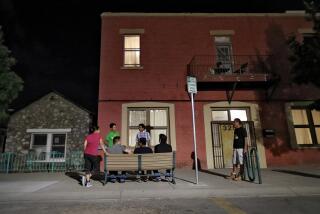Man Barred From Selling Tax Shelters
- Share via
Your home may be your castle, but don’t try to call it your parsonage.
A federal judge in Los Angeles has ordered a Palmdale man to stop telling people they can avoid taxes by taking a vow of poverty and declaring their homes a parsonage, the Justice Department said Monday.
Joseph Saladino and his organization, the Freedom & Privacy Committee, sold how-to kits promoting the parsonage ploy via the Internet for $200 to $3,000, according to the Justice Department.
Customers would pay an initial fee of $200 to join Saladino’s organization, and they’d pay more to purchase specific forms to set up supposedly nonprofit entities and claim refunds for past tax payments, according to court documents filed by the Justice Department.
Saladino did not return calls, and other officers of the Freedom & Privacy Committee could not be reached.
“The Justice Department is committed to fighting tax fraud, beginning with shutting down the operations of those who promote tax fraud schemes,” said Eileen J. O’Connor, Assistant Atty. Gen. for the Justice Department’s tax division. “We will use all appropriate tools, from injunctions to criminal prosecutions, to assure those who pay taxes that those who do not are not getting away with it.”
In a ruling Thursday, U.S. District Judge Florence-Marie Cooper barred Saladino from promoting the schemes. She also ordered him to post a copy of her order on his website.
The poverty-parsonage program is a fairly common tax scheme, according to the Internal Revenue Service.
In it, the taxpayer declares himself the prelate of his own church and has all of his income shuttled into his “corporation sole” -- a supposed nonprofit church -- which then pays all the prelate’s expenses.
Saladino’s other dodge -- the “claim of right” -- maintained that income earned for labor was not taxable, so anyone who paid income taxes could stop doing so and claim refunds for the last three years.
The only glitch: Neither claim has had any success in the courts. Judge Cooper held that Saladino knew or should have known that both claims were false or fraudulent.
Those who make such claims on tax returns can be subject to back taxes, tax penalties and possibly prison time.
More to Read
Sign up for Essential California
The most important California stories and recommendations in your inbox every morning.
You may occasionally receive promotional content from the Los Angeles Times.













